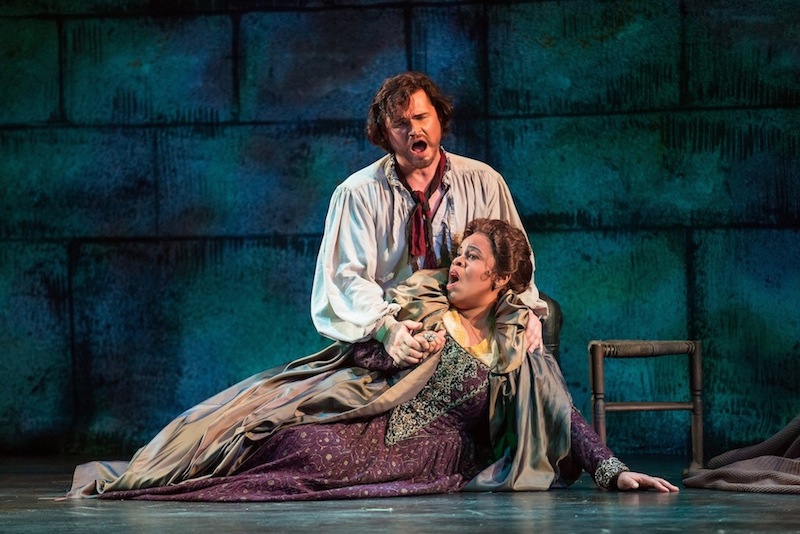Sarasota Opera’s “Trovatore” eventually sparks Verdian fire

Kirk Dougherty and Reyna Carguill in Verdi’s “Il Trovatore” at Sarasota Opera. Photo: Rod Millington
When the Marx Brothers vivisected Il Trovatore in A Night at the Opera, they couldn’t have chosen a better work to satirize. With its ancient hatreds, mistaken identities, mixed-up babies, love triangle (tenor good, baritone bad, soprano confused) swordplay, poison and gypsy hags, Verdi’s opera virtually defines and catalogs the absurdities of the genre.
Yet it also contains some of Verdi’s most characteristic and popular middle-period music, from the Anvil Chorus, to Leonora’s “Tacea la notte,” and Manrico’s “Di quella pira.”
This is the second time around for Trovatore in Sarasota Opera’s long-running complete Verdi cycle after a previous run in 1993. Friday night’s performance wasn’t wholly ideal in several respects, yet gathered momentum and dramatic intensity as it unfolded, and ultimately delivered the requisite Verdian blood and thunder.
As is often the case, Victor DeRenzi’s conducting was the most consistent element. Sarasota Opera’s artistic director drew vital and combustible, if not always uniformly polished, playing from the orchestra.
David Pershall looks like the idealized Verdi baritone and, in his company debut, delivered the best all-around performance of the four principals. His instrument is lacking somewhat in Verdian heft, but he sang Count di Luna with strength and expressive focus, his “Il balen del suo sorriso” the evening’s clear highlight.
With Kirk Dougherty as Manrico, for once the opera’s two opposing male leads, really did look like brothers, even twins. Dougherty, also making his Sarasota debut, sang with a firm Verdian line and plaintive, rather reedy tone. Underpowered for the part, his tenor turned a bit raspy under pressure and the singer sounded like he might be running out of steam after intermission, but he handled “Di quella pira” with aplomb, nailing every top C.
The two female leads were credibly sung though acting proved to be more of a sometime thing. Reyna Carguill possesses an attractive soprano though one that is not evenly produced throughout its range. Her “Tacea la notte” was serviceable but without the requisite gleam and amplitude. Carguill’s performance was undermined by dully generalized acting, though the soprano provided somewhat more dramatic acuity in the latter scenes.
As Azucena, Margaret Mezzacappa brought an ample voice and physique to the role. Mezzacappa’s wavery mezzo-soprano is on the high side for this assignment, lacking the smoky chest tones for Verdi’s weird gypsy. Dramatically she was not very involved with characterization either, completely missing the dark and tough side of the old gypsy hag.
It’s not often you find yourself checking a Trovatore program to see who sang Ferrando. Young bass Jeffrey Beruan has a huge voice and his imposing presence made an immediate impact at the top of the evening.
The Michael Schweikardt-Howard Tsvi Kaplan production was in the company’s style of sturdy tradition. Stephanie Sundine’s direction was a notch or two below her usual work with tired blocking and several moments of old-fashioned staginess. The choral singing was jarringly powerful under Roger L. Bingaman’s direction.
There are two more performances of Il Trovatore March 14 and 22. sarasotaopera.org